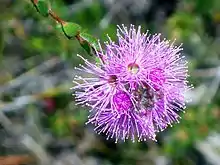Kunzea capitata
Kunzea capitata is a shrub species in the family Myrtaceae. It is native to New South Wales in Australia.[2]
| Kunzea capitata | |
|---|---|
 | |
| Ku-ring-gai Chase National Park, Australia | |
| Scientific classification | |
| Kingdom: | Plantae |
| Clade: | Tracheophytes |
| Clade: | Angiosperms |
| Clade: | Eudicots |
| Clade: | Rosids |
| Order: | Myrtales |
| Family: | Myrtaceae |
| Genus: | Kunzea |
| Species: | K. capitata |
| Binomial name | |
| Kunzea capitata | |
| Synonyms | |
|
Metrosideros capitata Sm. | |
Description
The species has a spreading or erect habit and may grow up to 2 metres (6 ft 7 in) in height, but is usually within the range of 0.5–1 metre (1 ft 8 in – 3 ft 3 in).[3] Flowers are pink to purple, or occasionally white. These are produced on the branch ends in "heads".[2] Leaves are 3.5–9 millimetres (0.14–0.35 in) long and 1.5–4.5 millimetres (0.059–0.177 in) wide, with recurved tips and 1 millimetre (0.039 in) long petioles.[2]
Taxonomy
The species was first formally described by English botanist James Smith in 1797 in Transactions of the Linnean Society of London, and given the name Metrosideos capitata.[1] The species epithet capitata is derived from the Latin word caput (head), alluding to the arrangement of the flowers.[3]
It was transferred to the genus Kunzea in 1846 by German botanist Gustav Heynhold.[1]
Distribution and habitat
The species occurs in heathland and dry sclerophyll forest from the Ulladulla district northward to Richmond River.[2]
Cultivation
The species prefers a moist soil in a lightly shaded to sunny position.[3] It is readily propagated by either seed or cuttings.[3]
References
- "Kunzea capitata". Australian Plant Name Index (APNI), IBIS database. Centre for Plant Biodiversity Research, Australian Government, Canberra. Retrieved November 28, 2009.
- "Kunzea capitata". PlantNET - New South Wales Flora Online. Royal Botanic Gardens & Domain Trust, Sydney, Australia. Retrieved November 28, 2009.
- "Kunzea capitata". Australian Native Plants Society (Australia). Retrieved 20 February 2020.